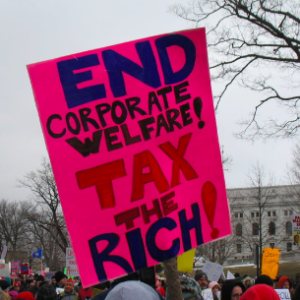The pundit class is falling all over itself to warn that Democrats in Congress and in the presidential race are trending too progressive and losing touch with Middle America.
“The Democratic Party is radicalizing,” warns an author in The Atlantic. “Centrist Democrats Squirm as ’20 Rivals Tilt Left,” reports the New York Times. There’s a lot of air time for centrist organizations like Third Way, cautioning “Democrats, don’t try to win the Twitter primary. Going viral could be lethal at the polls.”
These expressed concerns at least purportedly are not about the merits of progressive policies, but their political viability. There’s one huge problem with this analysis: Americans — not just Democratic voters, all Americans — support progressive policies by overwhelming margins.
Indeed, there’s a strong argument to be made that the policies labeled as “progressive” should instead just be labeled as “popular.”
Consider not the conventional wisdom of insiders who spend too much time talking to and at each other, but the actual data:
—The policy most associated with the “progressive” agenda, Medicare for All, earns 70 percent support among Americans, despite relentless trash talking by “serious” people. Groups like Third Way try to challenge support for Medicare for All with preposterous questions pitting Medicare for All versus imaginary alternative health plans “capping health care costs and covering everyone” — a false and profoundly misleading choice, since Medicare for All is demonstrably the best and most affordable way to achieve those goals.
—Americans are united in demanding aggressive action to slash prescription drug prices. Ninety percent of all Americans — and 91 percent of Republican voters — want to empower Medicare to negotiate drug prices (a policy that could easily reduce prices by 40 percent or more). Nonetheless, House Democrats are split over an aggressive plan to empower Medicare to negotiate and authorize generic competition if drug companies refuse to agree to reasonable prices. Democratic opponents of the bolder measure want to appear “reasonable” — but nine out of 10 Republicans support a more audacious approach!
—Two-thirds of all Americans favor expanding Social Security — not just maintaining it, but expanding it. Republicans favor the concept by a 2-1 margin.
—A strong majority of Americans favor doubling the minimum wage to a living wage of $15 an hour. Seven out of 10 Republican voters favor raising the minimum wage.
—Two-thirds of all voters say Wall Street has too much political influence. Three-quarters of voters favor reinstating the Glass-Steagall law that separated commercial banking from more speculative activity like investment banking. Two-thirds of Republican voters favor that approach.
—Three-quarters of Americans say the tax system favors the rich and has too many loopholes. Three-quarters say that the wealthiest and large corporations should pay more in taxes. More than six in 10 Republicans agree. Sixty percent of Americans favor a wealth tax on those with more than $50 million in assets.
There are exceptions, but much of the progressive agenda involves restraining corporate power, making health care a right and reducing the severe inequality plaguing the nation. Those measures have shockingly high levels of support. (Consider: only three-quarters of Americans correctly state that the Earth revolves around the sun.)
When you get down to actual policies, Americans are not concerned with abstract notions of what constitutes “moderate” or “centrist” — and the policies that self-described moderates support are far less popular than what is labeled progressive. This is perhaps because regular people react to policy proposals based primarily on what they think is right and wrong, not on the political class’s obsession with defining a make-believe middle ground that brings everyone together.
Actually, it turns out that everyone can come together — around an agenda built on American values of fairness and justice and a healthy distrust of concentrated power. There is in America no popular constituency to speak of for the drug companies and health insurers, no advocates for Wall Street or extreme inequality.
Policy analysts should spend a lot less time arguing about what’s popular and more about what’s right. But if the pundits are going to obsess about the polls, they should at least read them. Americans favor by overwhelming numbers the core of the progressive agenda.

